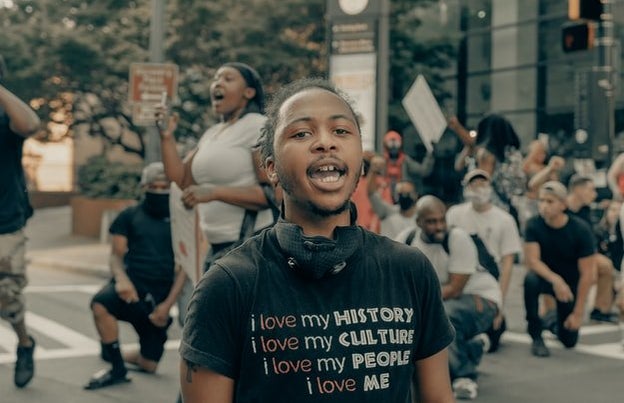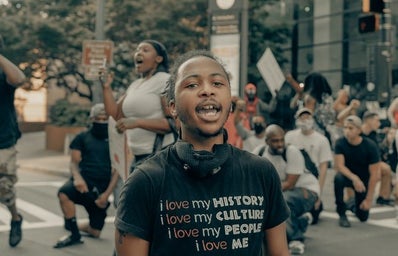Just because it’s the end of February does not mean we should stop caring about Black folk. It is extremely important to support and appreciate Black issues beyond just the (short) month of Black History, especially as American citizens because Black folks are an integral part of this country’s making. So I have come up with some ideas of little, yet big ways to maintain the same spirit of this month throughout the year and years to come.
- Don’t deny the history. Ever.
-
The reason a good chunk of white people find so much difficulty having so much concern for the Black community is oftentimes that to them, it feels like they are giving up a sense of power when they’re just giving a sense of respect. You don’t give up or lose anything within this scenario. There are many ways to get caught up in this mindset, but the truth of the matter is, gaining a larger understanding of Black history enables you to gain a greater respect for Black folks altogether. This larger understanding creates a radar that allows us to recognize something incorrect and conceptualizes how this incorrectness aids in the advancement of falsehoods in Black history. With that being said, we need to begin giving proper credit & recognition to Black folks who have paved the way for much of pop culture, fashion, music, inventions, beliefs, and much more up to this day.
- Teach yourself/remain aware.
-
We currently live in an age where there are so many resources available for us to learn from, and we don’t fully utilize this capability. I’m guilty of this and most likely you are too. However, one step we can take towards combating this can be through informing ourselves about Black history, which is American history that is commonly denied. We can also work on this by not only understanding, but resonating with the significance of Black inventions and overall contributions to society, and acknowledge why we were never accredited for these contributions. There are so many amazing books and stories that you can read that allow us to expand our minds on various critical issues. If anything mentioned in this piece is new to you, go and become aware.
-
Recognize & understand appropriation.
-
This one can be tricky, and I feel like this is why the assertion of microaggressions came into fruition. Just because you haven’t been caught, doesn’t mean it’s not wrong. There is a difference between cultural appreciation and cultural appropriation. Read that back. I don’t feel like I need to enter the discourse of why performing blackface is wrong. I don’t feel like I should explain why having dreads, braids, or cornrows as a non-Black person is wrong. Black women have faced discrimination in work environments and have been publicly condemned and judged. They have been told not to wear their natural hair in media and entertainment because it is “too black”. We have fought and are still battling not only with ourselves but with society as to what we choose to do with our hair. Very few people ever have an opinion on what white women do with their hair, but always feel the need to point out what Black women do with their hair. So when “Becky with the good hair” can come on social platforms with “boxer braids” and I can’t wear my locs because I would be considered “unkept” it’s a major issue and a microaggression in itself. Next, stop using AVE (African American Vernacular English) as a non-Black person. No one is saying you can’t rap along to your favorite rap song, but DO NOT say the N-word when it comes up in the lyrics. I feel like this portion is now reaching a ridiculous length because all of these things should just be obvious. For the most part, when white folks appropriate a culture, they know exactly what they’re doing and its significance. For example, the Crown Act was passed in 2019- long overdue mind you- and the fact that this act had to pass in the first place further validates the points made in this section.
- Question the system.
-
You should always be questioning something, and if by some reason you’re not, begin here. Why does the system function the way it does for as long as it has, and how has its perpetual structure affected anyone who isn’t white in America? How has various factors of the system, including the prison system, school system, healthcare system, and economic system, aided in building the structures such as the prison industrial complex, and school to prison pipeline? If these questions don’t resonate with you, there is an issue, make them resonate.
- Actually consume what you learn.
-
It’s really easy to go watch “Judas and the Black Messiah” because it came out during Black History Month but are you actually conceptualizing and processing the jarring issues depicted in the film? Because that is all the film was- a depiction that just so happened to be a depiction of our denied and swept under reality. If you watch a film like this there is no reason to still question why it’s difficult for Black people to trust the government and the system. You saw the movie, now what? You cannot just post a Black square on Instagram during the riots of BLM last summer, and have that be your only if not the main contribution to the cause. Recognize when you are being a performative activist, just because you put BLM in your bio, does not automatically make you an ally. What makes you an ally is engaging in some of the things I have pointed out throughout this piece, and learning from any previous mistakes and/or beliefs.
- Support Black-owned everything.
-
There are so many ways to implement very few changes, in order to support Black businesses. It can be as simple as changing where you get your coffee in the morning, where you get certain groceries, or even where you get your clothing. All it takes is switching up even just one aspect of the major corporations in which we consume. Just buy Black, that’s the point.
- Be unapologetically Black.
-
This portion of the list is more directed towards my Black folk reading this piece. For us, of course, Black history is- and should be- every day. Do not become an “Uncle Sam” or behave like an “Uncle Ruckus”, and you know exactly what I’m trying to get at here. We are not perfect, and we are all still learning every day. It is important for us to continuously engage in these activities also because there are so many factors and pressures that want to drag us into a space of disconnect from our history, the system is the biggest example of this. It may not be your fault that we learn about the Civil Rights Movement in black and white, but it is, however, your fault if you put the learning of your Black history within the system or the white man’s hands alone. Knowledge is out there and it is constantly revealing itself, do not remain ignorant to your own people.
“One of the things that has to be faced is the process of waiting to change the system, how much we have got to do to find out who we are, where we have come from, and where we are going.”
-Ella Baker



